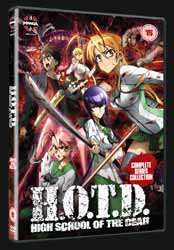|
Click here to return to the main site. DVD Review
A seemingly ordinary day at Fujimi High School rapidly descends into a terrifying nightmare and a deadly fight for survival for a group of teenage students who find themselves caught up in the chaos caused by an outbreak of a new disease that turns its victims into ravenous, flesh-eating zombies. Forced to slay large numbers of their teachers and fellow students just to escape the confines of the school, they soon learn that the outbreak is not only a local or even national problem but also a global one. As the pandemic rages out of control, society begins to collapse and everyday moral codes begin to crumble. Now it is up to Takashi Komuro to unite the small group of school friends and other survivors and lead them on a journey that they hope will take them to a place of safety beyond this new world of the living dead... High School of the Dead (the English title, abbreviated H.O.T.D., is the official one, though the Japanese title translates as the rather more resonant 'Apocalypse Academy') is a twelve-episode 2010 TV anime from the prestigious studio Madhouse, based on the manga by writer Shouji Sato and artist Daisuke Sato. The artist Sato is chiefly known as an illustrator of pornographic manga, both original and parody, something I bring up without further ado as it's impossible to avoid mentioning in talking about this show's key elements. While H.O.T.D. uses the zeitgeist-friendly scenario of an inexplicable (and never explained) outbreak of cannibalistic walking dead precipitating the rapid breakdown of society as an attention-getter, it would be a mistake to say this is the show's main feature. What H.O.T.D. is about is near-constant sexually suggestive titillation: in a word, fanservice. Every one of the teenage and adult female characters is absurdly physically developed (a shame the same doesn't go for their personalities), continually caught in suggestive poses, flashing her underwear or simply naked - indeed, two whole episodes in the middle of the run have the female cast wearing nearly nothing at all. While I'm not a prude and think that softcore sexual material - a part of anime's long history that's not going away any time soon - can be enjoyable and amusing if done well, H.O.T.D.'s unrelenting explicitness quickly grows tiring and, more seriously, fails to distract from the pedestrian script. Whereas a show like Gurren-Lagann, to mention a recent success, can get away with a barrage of fanservice as part of its general overheated exuberance, H.O.T.D. suffers from a weak storyline and a crucial lack of real humour that the moments of incongruous comedy typical of anime can't cover for. Leaving aside fanservice, it's a shame to say that H.O.T.D. adds little to the zombie apocalypse genre, itself long since mined of metaphorical depth and more creatively explored these days in gaming than TV or film. In the context of its chosen genre, in fact, H.O.T.D.'s main and perhaps unintended point of interest is the ardently gung-ho adoration of power, force and weaponry that would come off as mere adolescent power fantasy if it weren't for the script's political nuances. Liberal straw man characters pop up to deliver condescending diatribes about the futility of force to our brave young heroes, and the main adult male character in the second half - and the only trustworthy authority figure the party encounter - is an ultra-nationalistic political strongman who ruthlessly uses his considerable power and resources to impose his will on those fleeing the undead hordes. This kind of right-wing content can be hard to know how to read outside of its Japanese context; still, it's worth pondering how far the zombie apocalypse genre has come from its thoughtful, liberal roots in the movies of George Romero. As the cast move awkwardly from one environment and encounter to another, the script shows its threadbare nature and the characters seldom rise above the formulaic - even the most memorable, worryingly serene closet sadist Saeko and comedic gun-otaku Hirano (named for and based on the similarly weapons-obsessed author of the Hellsing manga, in one of the series' rare touches of wit) don't get the witty dialogue or nuanced characterisation that could make them shine. The conclusion of the series comes so abruptly, following the inconclusive despatch of an ineffectual villain, that it seems evident the makers are holding out for a second season - while there's certainly more of the manga still to adapt, it's hard to get excited over the prospect. The production is polished enough as befits a Madhouse feature, and fans of both the manga and non-stop fanservice will be in heaven, yet H.O.T.D. is sadly far from as thrilling as it could have been. A sadly missed opportunity for what could have been a truly fun series in the right hands. 5 Richard Hunt |
|---|

